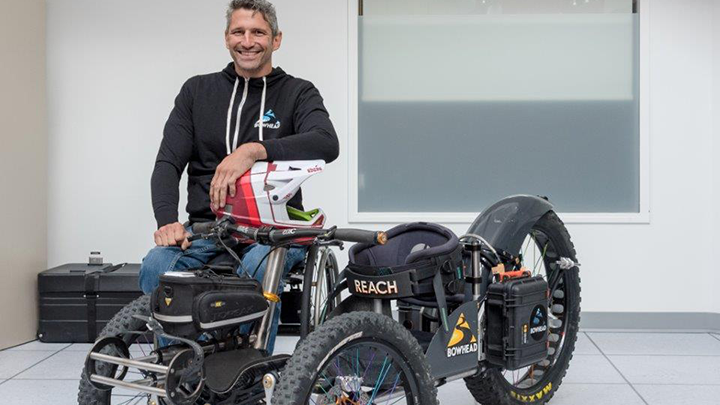
August 30, 2019

Entrepreneur and innovator Christian Bagg poses with his Bowhead Reach — an adaptive electric mountain cycle that can manoeuvre through single-track trails. The Glenrose Rehabilitation Research Innovation and Technology (GRRIT) Hub has announced a $1.8 million investment from the Government of Canada to support the development of new healthcare technologies and products in Western Canada.
Story by Vanessa Gomez | Photo by Raylene Pearson
EDMONTON — The spirit of innovation remains alive and well at the Glenrose Rehabilitation Hospital (GRH) — and it’s now attracted some major national support.
The GRH Foundation announced Aug. 29 that it will be receiving an investment of more than $1.8 million from the Government of Canada to expand the Glenrose Rehabilitation Research Innovation and Technology (GRRIT) Hub.
This funding will support the development of new healthcare technologies and products in Western Canada, bring them to market more quickly and create high-quality jobs and training opportunities.
“Through this expansion, we will reduce market barriers for small- and medium-sized businesses, create well-paying jobs and enhance Alberta’s competitiveness in the life sciences sector on a global scale,” says Navdeep Bains, the federal Minister of Innovation, Science and Economic Development, as well as Western Economic Diversification Canada.
In addition, the GRRIT Hub will be expanding its services to Calgary in collaboration with the Foothills Medical Centre, Tom Baker Cancer Centre, and the Ward of the 21st Century initiative.
Established in 2015 with the aim of advancing health innovation in Western Canada, the GRRIT Hub fosters interactions between Alberta Health Services (AHS) clinicians and physicians, patients and families, small and medium-sized businesses, post-secondary institutions, donors, and funding groups.
Through these partnerships, new technologies are developed, trialed to assess their effectiveness and integrated into clinical practice to help patients with their rehabilitation.
“In order for us to help our patients, we need to have these innovative products available to them,” says Dr. Gary Faulkner, Director of Research and Technology at the GRH. “The only way we can do that is by providing resources to assist these companies in moving their products to the market and to our patients. If they are successful, our patients will benefit.”
Christian Bagg — a previous recipient of Hub support — represents the kind of entrepreneur and innovator this program is designed to help. After a snowboarding accident left him paralyzed in 1996, he was determined to work at getting back to the outdoors.
An apprentice machinist at the time, he used his knowledge to begin designing his own wheelchairs, which led him to found his own company, Bowhead Corp.
“The company is really driven by the outdoors,” says Bagg. “There’s a market to help people who are facing the same challenges.”
Bowhead Corp. developed the Bowhead Reach – an adaptive electric mountain cycle that can manoeuvre through single-track trails. The company has sold 20 bikes since April, giving people who live with mobility issues the opportunity to rediscover their love of the outdoors.
Bagg believes the GRRIT Hub is essential to the development of upcoming healthcare technologies.
“The ability to do the work myself really allowed it to progress,” he says. “But sometimes the cost for someone with an idea to create something is a major barrier. That’s why the GRRIT Hub is so amazing.”